Pound Cake
This post may contain affiliate links. Read the full disclosure here.
This basic pound cake recipe is buttery, dense, and perfect with a cup of tea or coffee. Serve the cake plain, with a dusting of powdered sugar, or a dollop of homemade whipped cream.
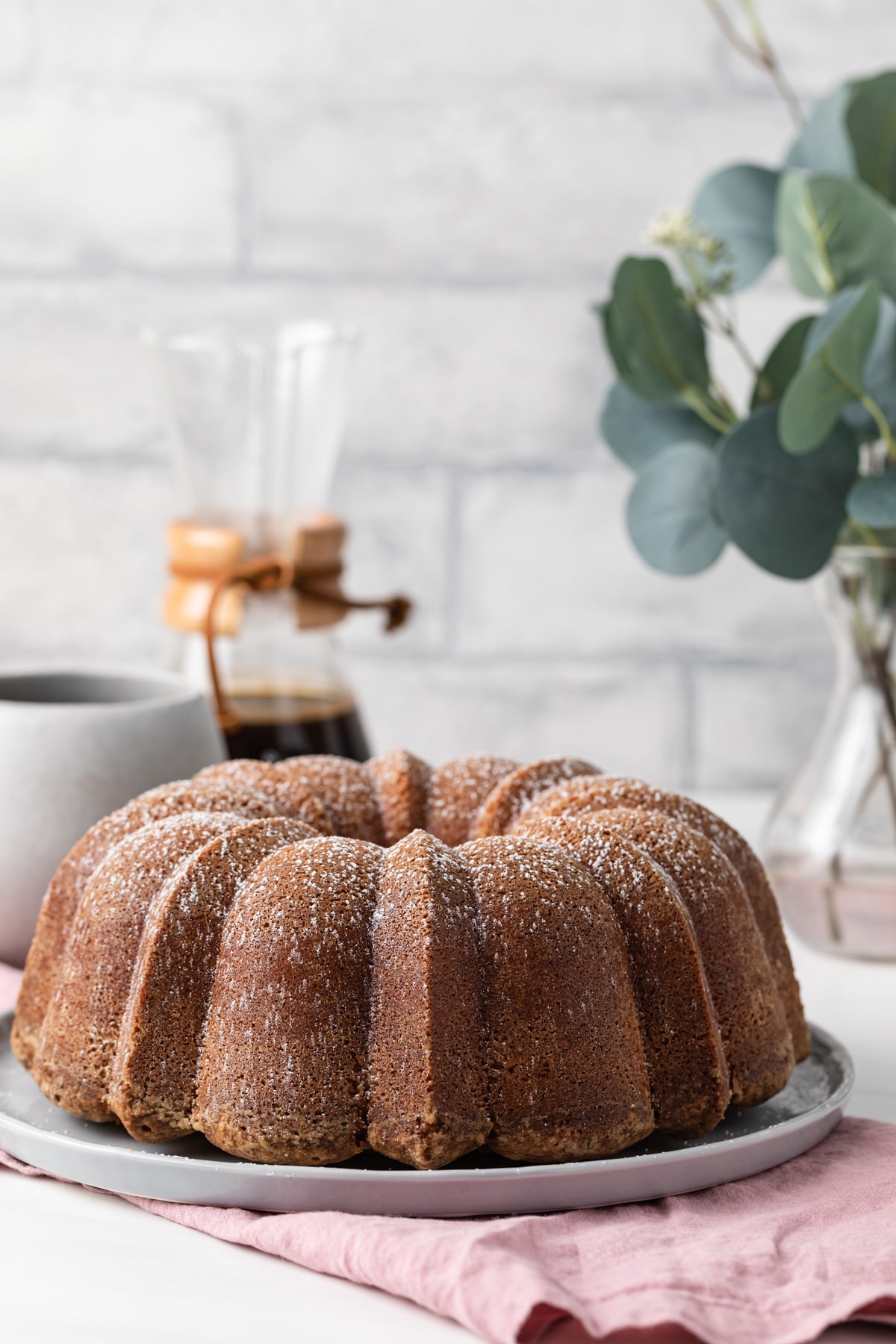
Want To Save This?
I don’t think there can be too many recipes for cake! Especially a sweetly dense cake that is still surprisingly soft.
This pound cake isn’t what you’d call a classic pound cake. I’ve veered from the traditional ratio of ingredients and added leavening to lighten the texture.
It’s adapted from my sour cream pound cake and cream cheese pound cake which are always a huge hit. But if you prefer more flavor, give my strawberry pound cake, peach pound cake or orange pound cake a try!
Today’s recipe is flavored with almond extract and it’s definitely one of the better pound cakes I’ve tried. I added a very small amount of baking powder to soften the cake while still keeping it dense.
I learned a lot when making this cake and will share all the details throughout the blog post so be sure to read through. Everything down to the pan and the quality of butter used made such a difference in the final product.
When it comes to topping the cake, powdered sugar is my preferred choice but whipped cream and fresh berries are also a great option.
Why this recipe works
- Using a whole pound of butter will leave the cake rich and buttery like the original pound cake recipe.
- Cake flour will give a tight crumb that remains supremely soft.
- Adding a touch of baking powder also keeps the crumb soft and tender.
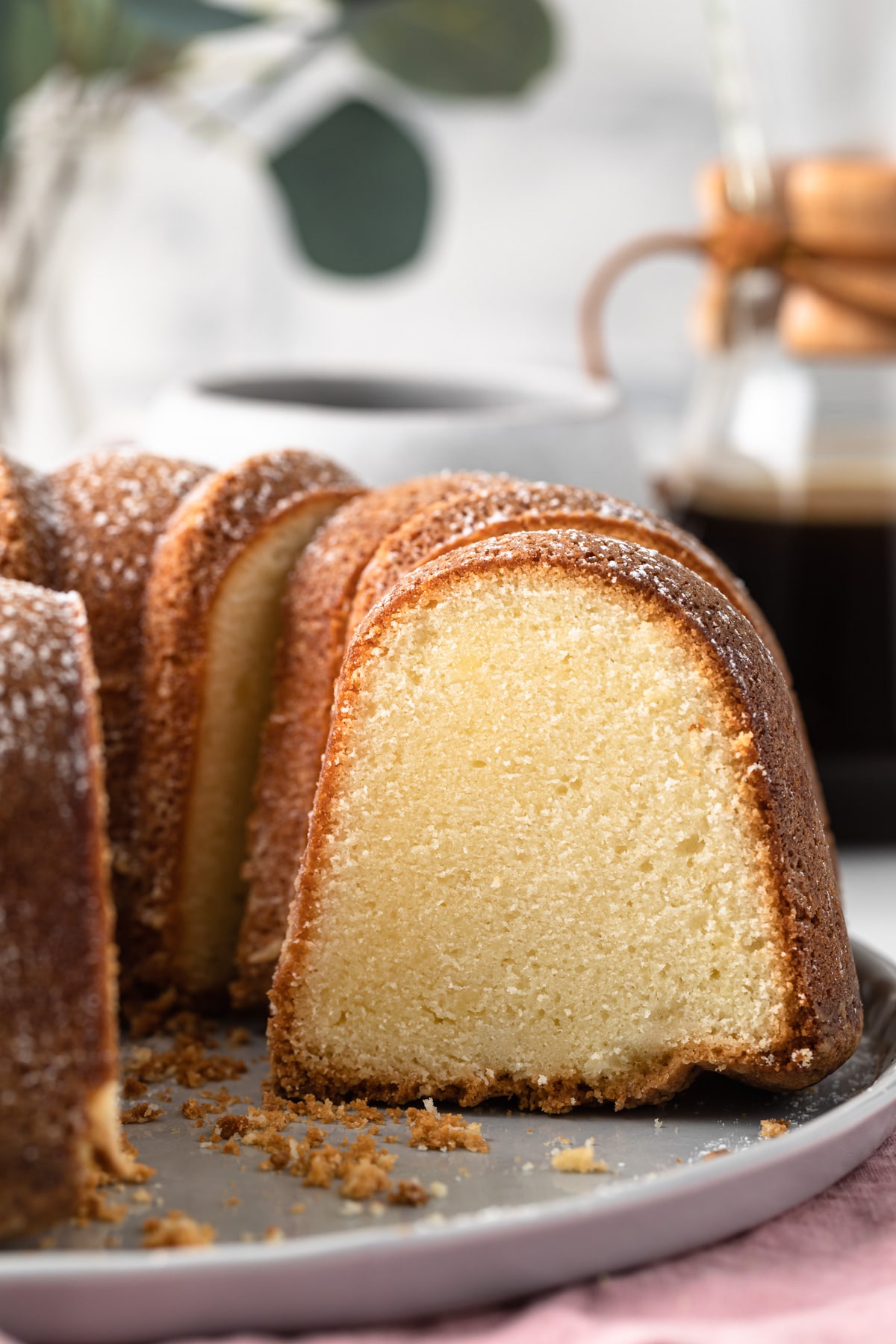
Pound cake recipe
Traditional pound cakes are made with only four ingredients – 1 pound of butter, 1 pound of sugar, 1 pound of eggs, and 1 pound of flour. This is how it got the name.
Today, you’ll see all sorts of variations in the recipe but the results are often the same – a rich, moist, buttery cake that has a deep golden crust.
You’ll adore my lighter version but make sure you follow all the tips and tricks for a successful product. I had many failures when developing the recipe and will go over everything in the next few sections.
Ingredients
The ingredients are pantry staples so you most likely have them on hand. Let’s discuss…
- Butter: Use unsalted butter of good quality. I made countless cakes and learned that low quality, generic butter caused my cakes to stick to the pan.
- Sugar: Regular granulated sugar is best for this recipe.
- Eggs: The recipe uses only 5 eggs which is far from a pound. I found that using any more than this will cause the cake to taste eggy.
- Flavoring: Vanilla extract and almond extract are for flavoring the cake. You can omit the almond if you don’t desire it.
- Milk: A little milk will help keep the texture of the cake soft and moist. Make sure it is at room temperature.
- Flour: Use cake flour! This is important for keeping the gluten development low. It is also softer and finer meaning the end product will have a tender, tight crumb.
- Leavening: You only need about ½ a teaspoon of baking powder for pound cakes. Any more than this will change the integrity of the cake’s traditionally dense crumb.
To bake this cake you’ll need:
- Bundt pan: A 12-cup bundt pan is best for the amount of batter this recipe yields. I also recommend using a lighter colored pan since the cake bakes for an extended amount of time. Darker pans will work but keep in mind the crust will be darker.
- Mixer: Either a stand mixer fitted with the paddle attachment or and handheld electric mixer will work. I’ve used both and get good results with either.
How to make pound cake
You’ll find this to be a very easy pound cake recipe. It’s simple to put together and yields fantastic results every time. Make sure to preheat the oven well in advance and allow the cold ingredients to come to room temperature before using them.
The batter – The batter is made by using the creaming method. The butter and sugar are creamed together until pale in color and increased in volume. The remaining ingredients are gradually added until the batter is emulsified and smooth.
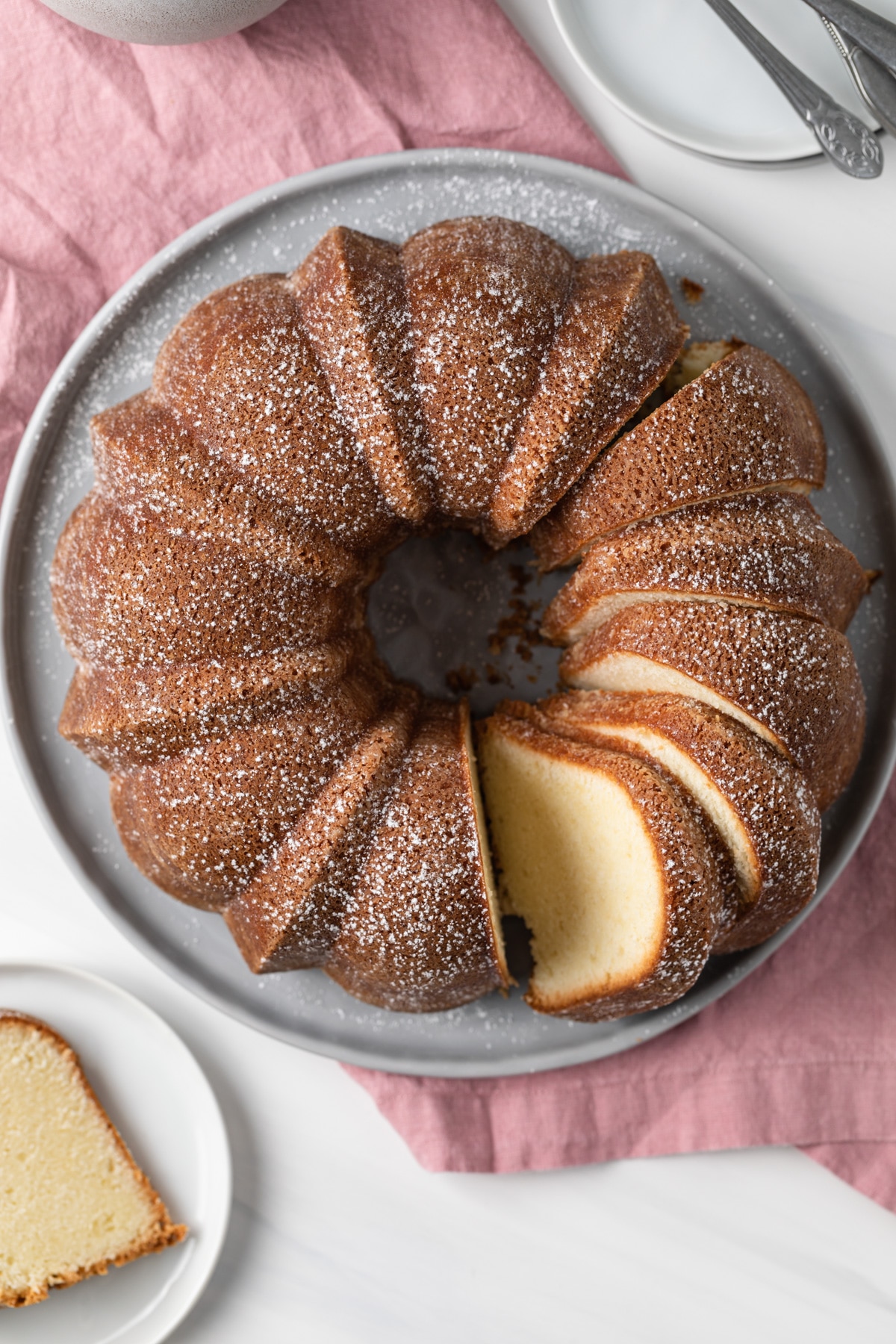
Step 1: Cream the butter and sugar
Creaming the butter and sugar means you’re going to beat them together on medium-high speed until it becomes light and fluffy. A stand mixer with the paddle attachment works best but you can successfully use a handheld mixer.
You’ll need to stop and scrape down the sides of the bowl as needed to get it all creamed together properly.
The purpose of creaming is to add air to the mixture. This will help lighten the cake and keep it tender.
ⓘ When choosing butter for pound cake, look for quality butter. Lower quality butter can contain more water content which gives inconsistent results. Butter is the star of the show here so don’t cut corners.
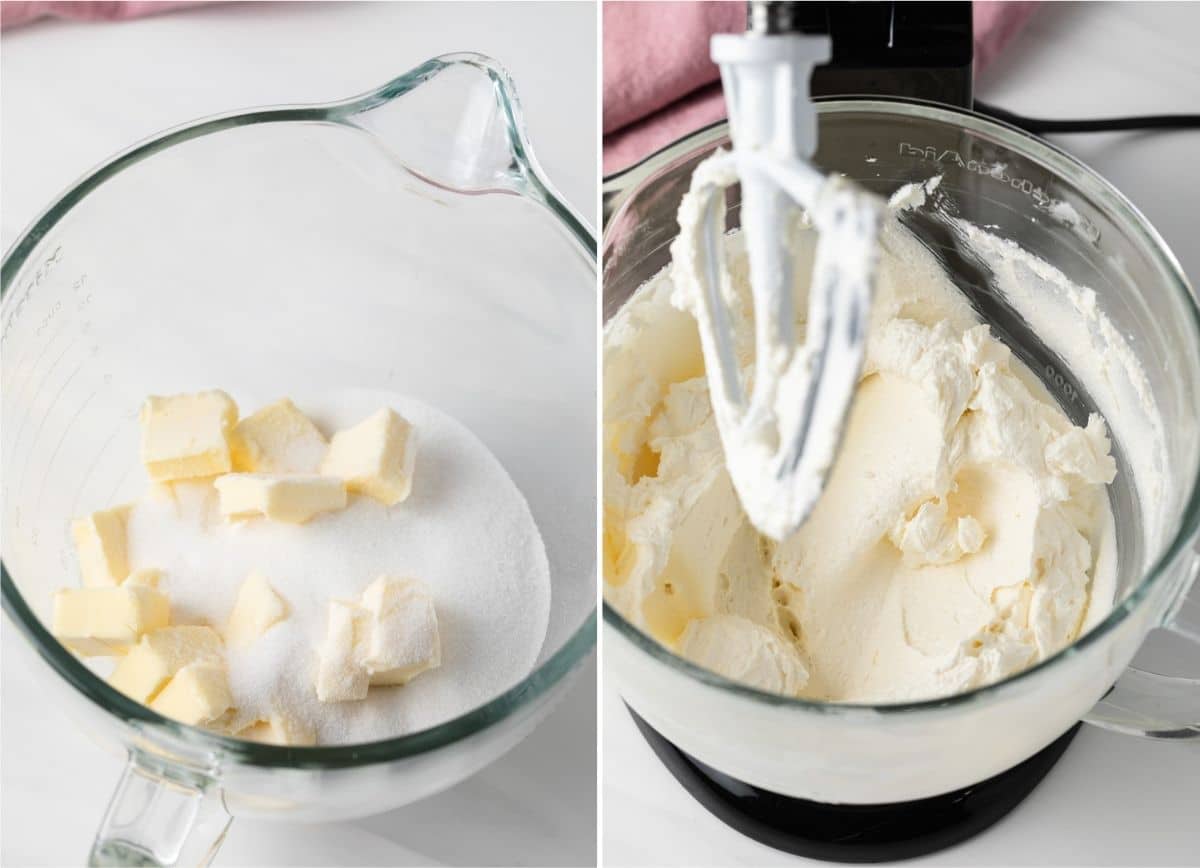
Step 2: Add eggs and flavoring
Once the butter and sugar are well creamed and look pale in color, it’s time to add the eggs.
Make sure the eggs are at room temperature. This will help them emulsify into the butter mixture more easily.
Turn the mixer to low speed and add one egg at a time. Let the egg mix in for about 20 seconds before adding the next one. Next, add the vanilla and almond extract.
ⓘ If the mixture looks curdled, don’t stress. This can happen if the eggs and butter aren’t at the same temperature. It should come together properly once the flour is added.
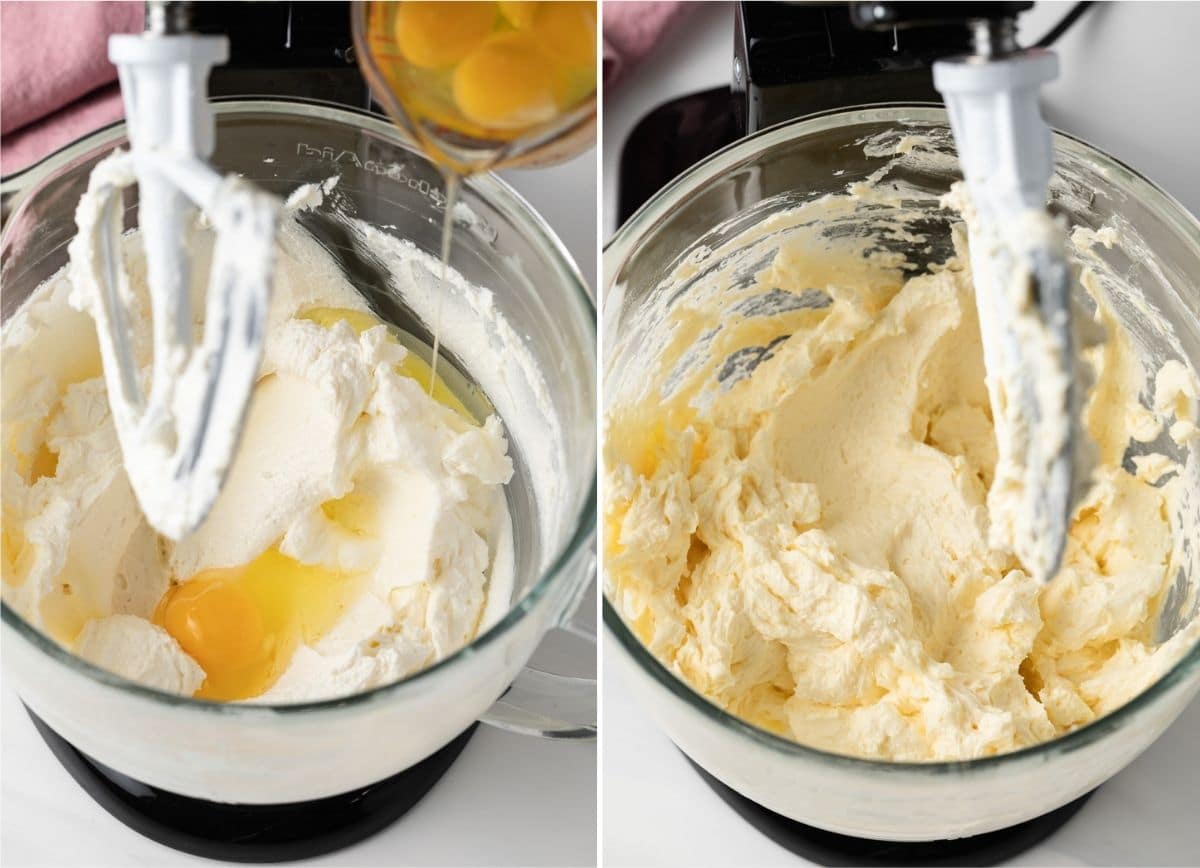
Step 3: Add the dry ingredients
Put the flour, baking powder, and salt in a medium bowl and stir it together with a whisk. Remember to use cake flour. It’s lower in protein content which means there’s less gluten development.
Sift half the flour mixture into the butter/egg mixture. Stir together just until the flour is almost fully incorporated. You can use a silicone spatula to do this or use the mixer on the lowest setting. You want to take extra care to not overmix.
Using the same method, mix in the milk just until incorporated. Finally, sift in the remaining flour and mix just until you no longer see streaks of dry flour.
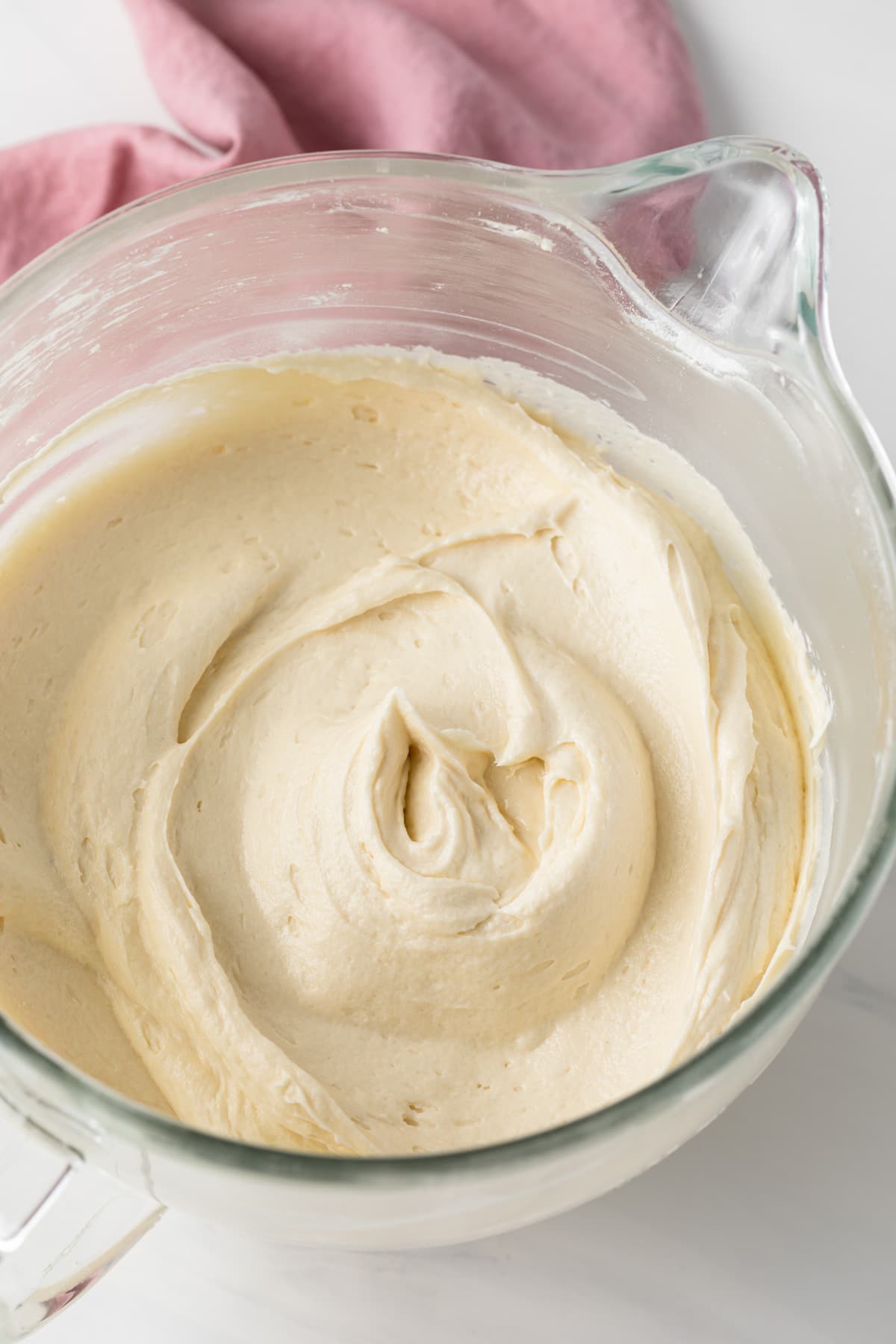
Step 4: Bake
Transfer the batter to a greased bundt pan and bake for one hour and 25 minutes. The cake is baked at 325°F so the long bake time is necessary to ensure the cake is cooked all the way through.
Since bundt pans are quite tall, I like to move the oven rack to the lower-third position for baking. This puts the pan more in the center of the oven and promotes even cooking.
Once the cake has finished cooking, allow it to cool on the pan for 10 minutes. Then, transfer it to a wire rack to cool completely.
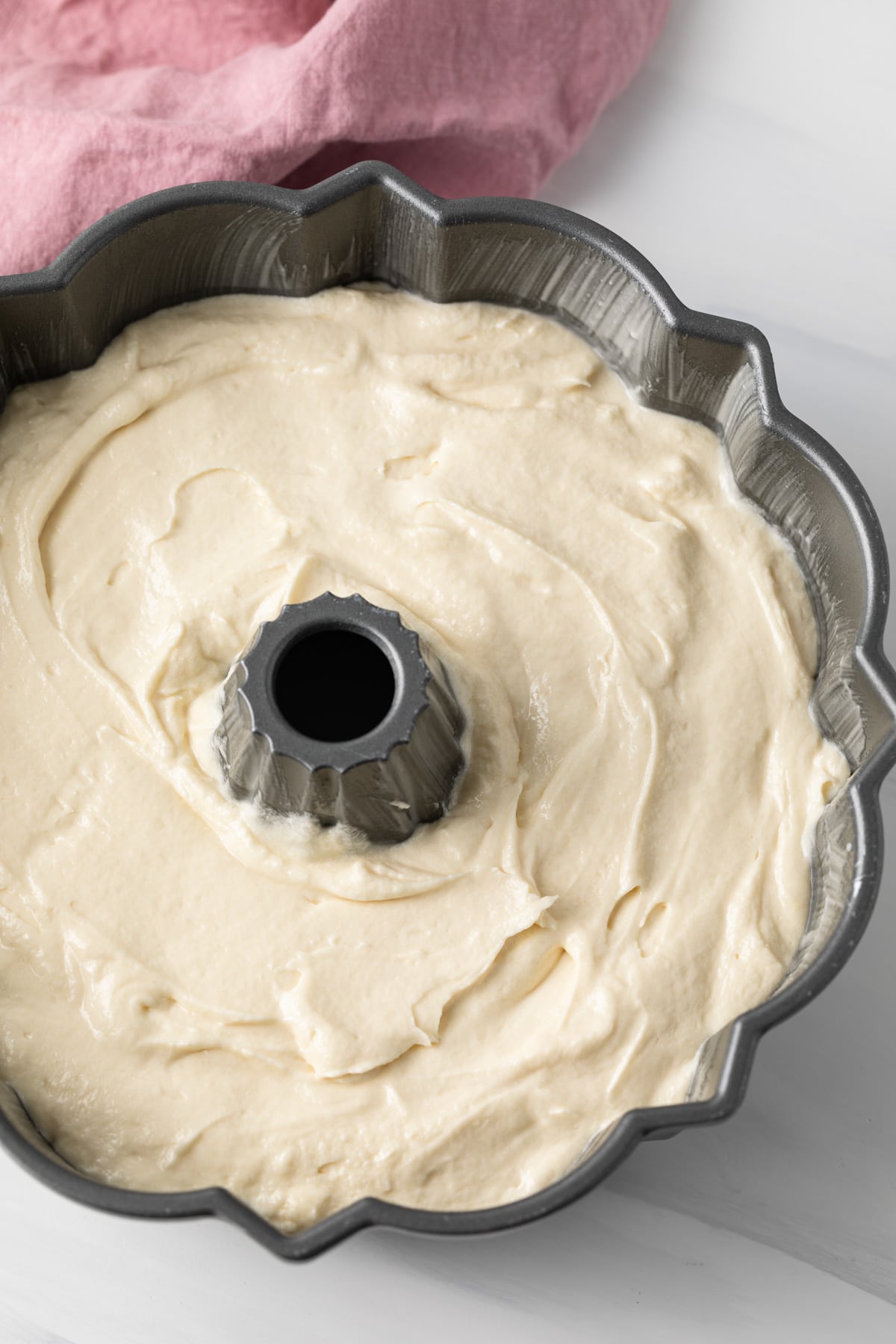
ⓘ Prevent pound cake from sticking – Grease the bundt pan well with vegetable shortening. Avoid using butter for greasing; it will act like glue when mixed with flour. Then lightly dust the pan with almond flour and tap out the excess.
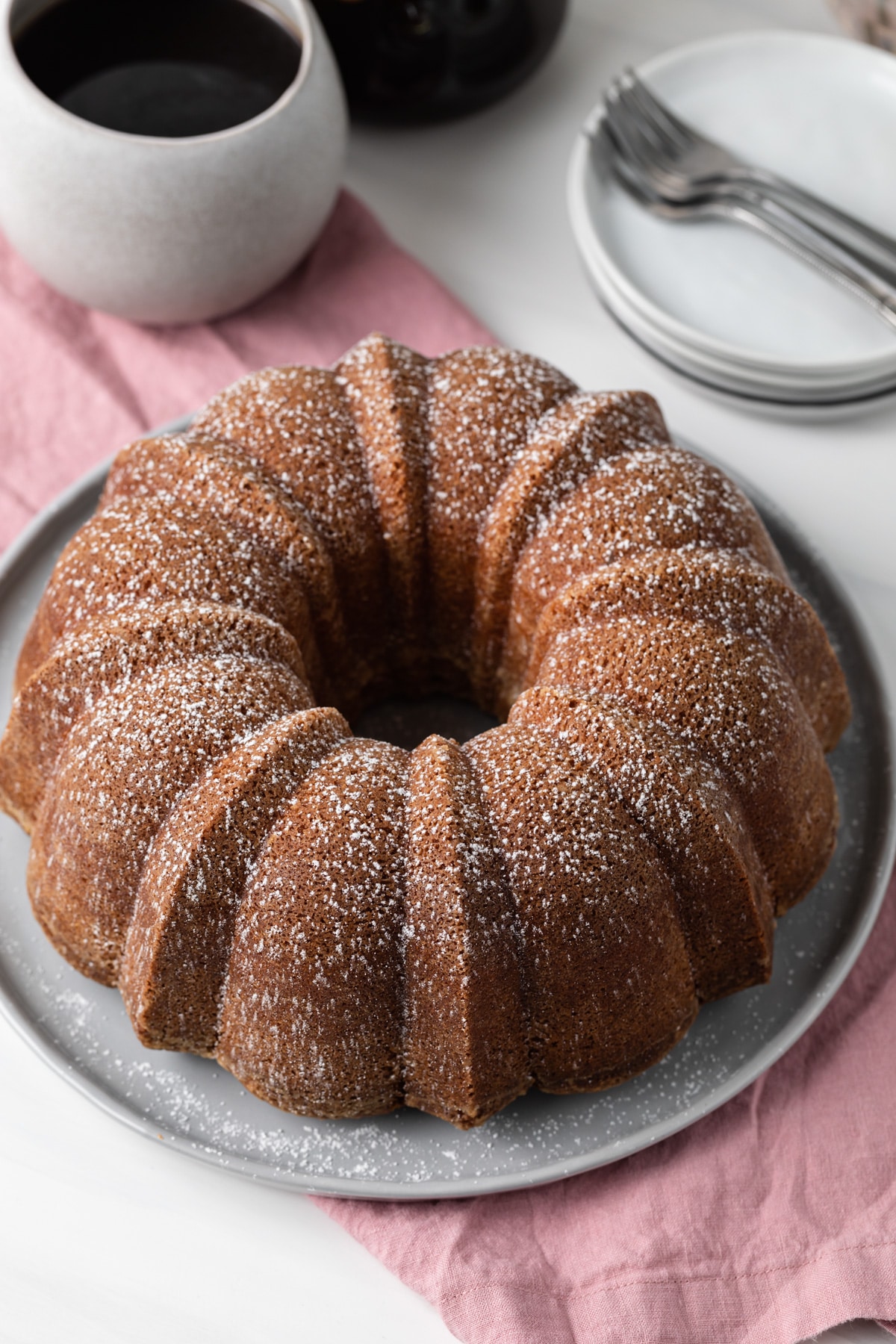
Basic Pound Cake
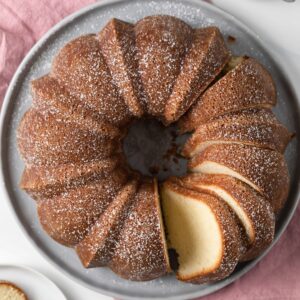
Ingredients
- 2 cups (452 g) unsalted butter, softened
- 3 cups (600 g) granulated sugar
- 5 large eggs, room temperature
- 2 teaspoons vanilla extract
- 1 teaspoon almond extract
- 3 ¼ cups (390 g) cake flour, sifted
- ½ teaspoon baking powder
- ½ teaspoon salt
- ¾ cup (177 ml) milk, room temperature
Instructions
- Position the oven rack to the lower-third position (just below the center of the oven) and preheat to 325°F. Grease a 12-cup bundt pan and dust with flour, tapping out any excess; set aside.
- Using a stand mixer fitted with the paddle attachment or handheld electric mixer, cream the butter and sugar together on medium-high speed for 5 minutes until light, fluffy, and increased in volume. Stop and scrape down the sides as needed. (If your butter isn’t super soft, you may need to add the sugar in 2 addition. Just mix in half at a time then continue to beat for 5 minutes.)
- With the mixer on low speed, add the eggs, one at a time, mixing to combine after each addition. Then add the vanilla extract and almond extract; beat until well combined. (The batter may appear curdled at this point. That’s okay, it will smooth out once you add the flour.)
- Add the flour, baking powder, and salt to a medium bowl. Stir with a whisk to combine. Sift half of the flour mixture over the butter mixture and gently mix until just incorporated.
- Add the milk and continue to mix until almost fully incorporated.
- Sift in the remaining flour and mix just until the flour is incorporated and no dry streaks are visible. Take care not to over mix.
- Transfer the batter to the prepared pan and bake for 1 hour 25 minutes, until a toothpick inserted into the center comes out with only a few moist crumbs attached.
- Cool the cake in the pan for 10 minutes then invert it onto a wire rack to cool completely. Serve with a dusting of powdered sugar or whipped cream and fresh berries if desired.
Notes
- Cake flour: It is important to use cake flour for this recipe. All-purpose flour will cause the cake to be dense due to the amount of mixing involved. You can find cake flour on the baking aisle at your local grocery store.
- Sift: Sifting the flour into the batter makes the cake lighter. It also breaks up any large clumps of flour, making it easier to incorporate into the batter.
- Use vegetable shortening to grease the pan. Butter will act like glue once mixed with flour and the cake may stick.
- If your cakes often stick to the pan, try dusting a light layer of almond flour over the greased pan instead of using regular flour.
- The cake will keep for up to 4 days wrapped tightly and stored at room temperature or for up to 1 week stored in the refrigerator.
- The cake can also be frozen for up to 3 months. Thaw in the refrigerator overnight.
Nutrition
The nutrition information provided is for convenience and as a courtesy only. It is not guaranteed to be accurate because nutrition information can vary for a variety of reasons. For precise nutritional data use your preferred nutrition calculator and input the exact ingredients and brands you used in the recipe.

I just made this pound cake and when I say delicious and moist it’s definitely going to be for the holidays. It’s 5 stars but my phone is acting up. You will not be disappointed
First and foremost this cake was so beautiful I didn’t even want to cut it I waited for a min. To cut into it. Thanks for sharing.
This was an easy to follow recipe. Cake is light and delicious. First time making a pound cake, I will make this again and again.
Hello..nice I found you..What kind of cake flour do you use?
I use Bob’s Red Mill cake flour but any brand should be okay to use.